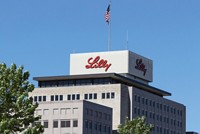Advertisement
Grab your lab coat. Let's get started
Welcome!
Welcome!
Create an account below to get 6 C&EN articles per month, receive newsletters and more - all free.
It seems this is your first time logging in online. Please enter the following information to continue.
As an ACS member you automatically get access to this site. All we need is few more details to create your reading experience.
Not you? Sign in with a different account.
Not you? Sign in with a different account.
ERROR 1
ERROR 1
ERROR 2
ERROR 2
ERROR 2
ERROR 2
ERROR 2
Password and Confirm password must match.
If you have an ACS member number, please enter it here so we can link this account to your membership. (optional)
ERROR 2
ACS values your privacy. By submitting your information, you are gaining access to C&EN and subscribing to our weekly newsletter. We use the information you provide to make your reading experience better, and we will never sell your data to third party members.
Mergers & Acquisitions
Merck pays premium prices to acquire Prometheus Biosciences
The pharma giant is betting on a clinical drug for autoimmune diseases
by Shi En Kim
April 18, 2023

Merck & Co. announced that it will acquire the immunology company, Prometheus Biosciences, which specializes in inflammatory bowel disease (IBD) treatments. Under the terms of the deal, Merck will purchase the clinical-stage firm for a total of $10.8 billion, or $200 per share. Prometheus stock was trading at around $110 per share before the deal.
“This transaction adds further diversity to our overall portfolio and is an important building block to strengthen the sustainable innovation engine that will drive our long-term success,” said Merck’s board chairman and CEO, Robert M. Davis, during an investor call on April 17.
Prometheus has no approved targets. Its lead asset, PRA023, is a monoclonal antibody that inhibits cytokine TL1A, a signaling protein that is a key driver of many autoimmune diseases. Last December, the developer announced that the drug candidate aced its Phase 2 clinical trial for ulcerative colitis and another Phase 2a study for Crohn’s disease. Both these conditions, collectively known as IBD, affect 2 million patients in the US, according to Merck. The company plans to carry out Phase 3 trials for PRA023 in late 2023 or early next year.
Although it is rare for a company without an approved drug to be bought for billions of dollars, several reasons make the Merck-Prometheus deal a no-brainer, says Chris Garabedian, a portfolio manager at the venture capital firm Perceptive Advisors and the CEO of the life sciences accelerator Xontogeny. PRA023’s positive Phase 2 results suggest the drug could be a leader in the inflammatory diseases space. The IBD market is a lucrative one—it is estimated to reach over $30 billion in value by 2031, according to Allied Market Research. AbbVie’s Humira, an antibody treatment for inflammatory-disease indications, including IBD, is a current bestseller that generated $21.6 billion in annual sales last year. But AbbVie’s market exclusivity agreements for the drug expired end of January. Bolstered with a patent exclusivity for PRA023 that extends into the 2040s, Merck is betting on PRA023 to fill this Humira-sized hole. The pharma giant projects that PRA023 will reach multibillion-dollar peaks sales in ulcerative colitis and Crohn’s disease each by 2028.
The sticker price of nearly $11 billion for Prometheus is well within Merck’s monetary means, in large part thanks to sky-high profits from its anticancer blockbuster drug Keytruda. Keytruda exceeded $21 billion in revenue last year, but comes off patent in 2028. Prometheus’s price tag of less than 4% of Merck’s entire stock value is “a small price to pay,” Garabedian says.
Prometheus—which went public in 2021 and announced a second public offering of $500 million last December—isn’t doing so shabbily either, despite a market downturn and a period of low investor confidence in the industry. The San Diego–based company probably had the financial wherewithal to advance its clinical-stage assets across the finish line, Garabedian says. He conjectures that Merck had no choice but to pay above the market value and offer a deal too favorable for Prometheus to pass up before other potential buyers could close in on the company. He calls the transaction a win-win for both buyer and seller.
“Imagine if Merck was able to have the biggest selling cancer drug and the biggest selling [immunology and inflammation] drug,” he says. “That would put Merck in a very good position.”




Join the conversation
Contact the reporter
Submit a Letter to the Editor for publication
Engage with us on Twitter